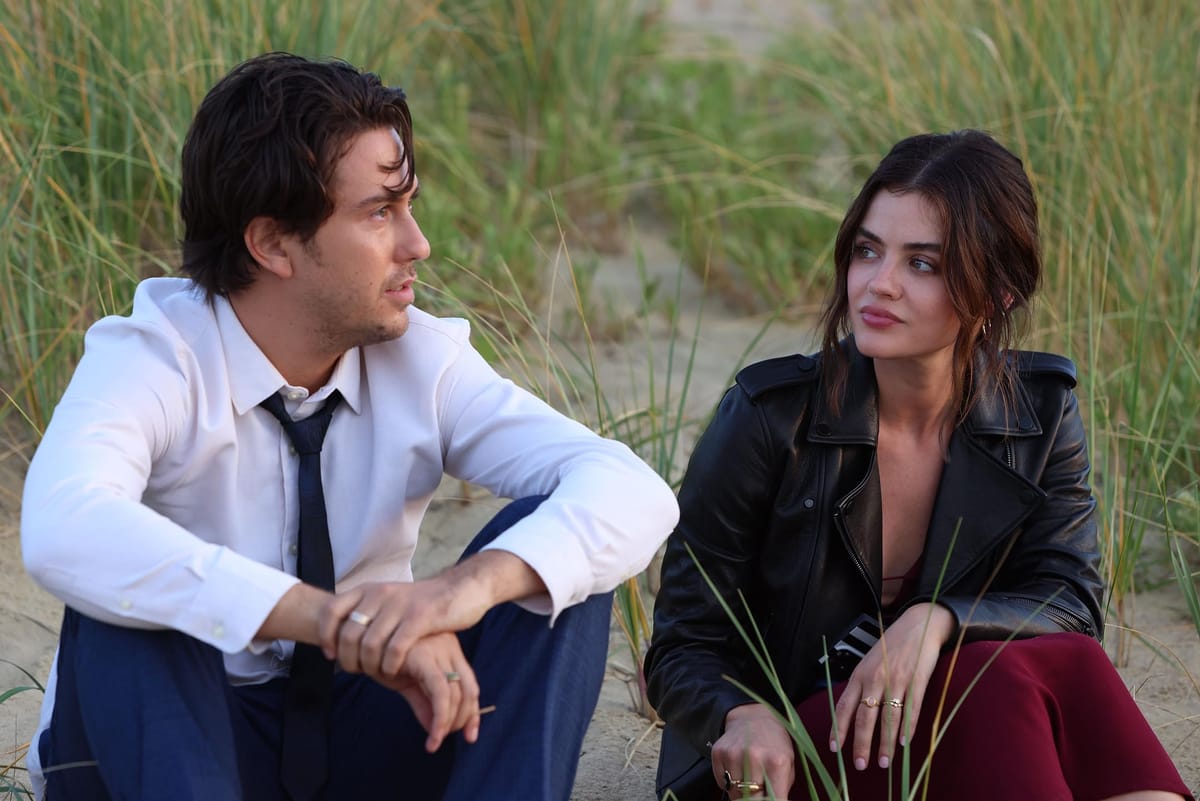Which Brings Me To You

Given the internet’s tendency to (understandably) bemoan the lack of theatrical romcoms as of late, and the electric reaction to the middling (at best) Anyone But You, I’ve been stunned by the lack of hype around Which Brings Me to You. Admittedly, Nat Wolff and Lucy Hale certainly aren’t stars on the level of Glenn Powell or Sydney Sweeney. But it would have seemed natural to ride the “people want romantic comedies, actually” wave anyways. Some sort of marketing push, ginning up word of mouth, something. I’m sure the leads have done some media, but it’s not been sufficient to get people talking. I only happened upon it because I saw the poster for a movie I hadn’t heard of at a local theater, and thought “Sure! Why not?”
Will and Jane (Nat Wolff and Lucy Hale, respectively) are bored. They’re guests at a wedding where they know no one, barely even the bride and groom. They meet at the bar, one thing leads to another, and start making out in the coat room. Just as things are heating up, Will puts a stop to the proceedings, insisting that he’s in a weird place and maybe they could just talk for a bit? Jane begrudgingly agrees, if only because it seems like the least worst thing to occupy her time. To help lighten the mood after their “humiliating sexual experience”, Will offers to share a story of embarrassment which promises to dwarf theirs: the first time he got a blow job, he came in his own eye.
Thus begins the swapping of histories which forms both the structure of the narrative, as well as the mechanism by which they get to know each other. They forgo the bland, boring small talk in favor of telling each other all about their relationships, digging deep into their personal psychoses and failings, and the varied ways in which they repeatedly engage in self-sabotage. Their conversations and bonding time long outlast the wedding, as their purpose here is no longer to partake in someone else’s story: it’s to forge their own.
This is an immensely charming movie, full of many clever little turns of phrase, quick quips, and dense with self-deprecation. Will and Jane have the shared instinct of using jokes to keep others at a distance, to short-circuit connection by not taking anything too seriously. So even as they go through this exercise which cannot help but bring them together, they’re constantly laughing at themselves. But as they go deeper, and as the relationship tales get more serious and emerging patterns reveal some considerable emotional baggage, the humor starts to serve more as a device to welcome the other in by acknowledging just how much of a screw-up they were.
Wollf and Hale have an instant chemistry and repartee, so even some of the more incisive barbs thrown at the other land entirely playful and flirty rather than harsh. It helps that with both of them baring their souls, neither comes out looking like a saint. They’re not monsters by any means, just broken people who are bad at relationships, who have made many a mistake in love, who have unintentionally hurt others, all of which has them questioning whether they’re even meant to be with anyone.
The stories are sweet and relatable, if not for the specific situations, at least for the insecurities and anxieties that feed into them. Sure, there’s an element of unbelievability to a few (such as Will’s rendezvous with Eve, played by Genevieve Angelson), but they mostly serve their purpose, which is to tell us more about who these people are, and how they got here. And once we’re in, they land as realistic and recognizable relationship dynamics. Not necessarily healthy ones: again, see the premise. But ones you’re likely familiar with, hopefully more from media than real life.
Overall, it does feel a bit formalist, even as it tries to hide that scaffolding. But we have a handful of key locations as the day (and night) progresses, there are emotional peaks and key reveals done exactly how and when you expect. There’s a bit of extra bloat at points that feels too much like screenwriter Keith Bunin wanted to ensure things were balanced more than natural. Most egregious is one key moment late in the film, which feels forced in a way that was bothersome and distracting. So the script isn’t perfect.
That being said, it’s ultimately able to navigate the waters quite competently. It’s not going to set the world on fire, no. But it’s funny and lovely and warm and touching and heartbreaking, sometimes all at once. I found myself chuckling along with the film for most of the runtime: while big laughs were missing, regular people being endearingly silly was plenty enough to delight me from start to finish. And a number of their relationship stories brought out the tears, a testament to director Peter Hutchings knowing when to let those scenes breathe. This was always unlikely to be a classic. But when you’ve a healthy environment for romcoms, not every one needs to be. Sometimes all you need is to be reminded of how wonderful forming a deep bond with someone truly is.